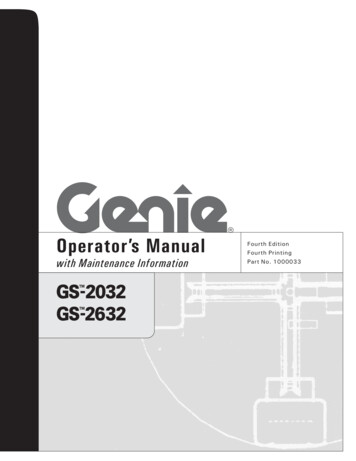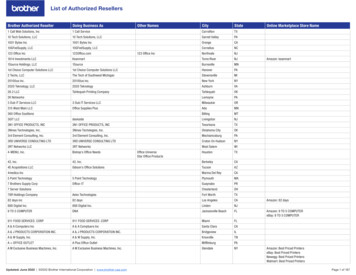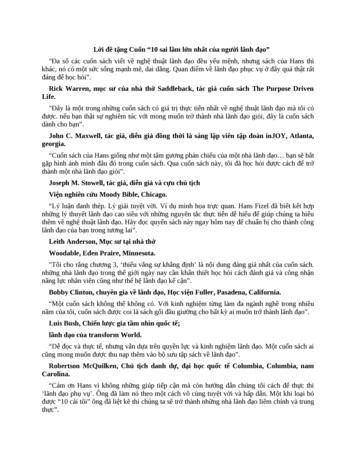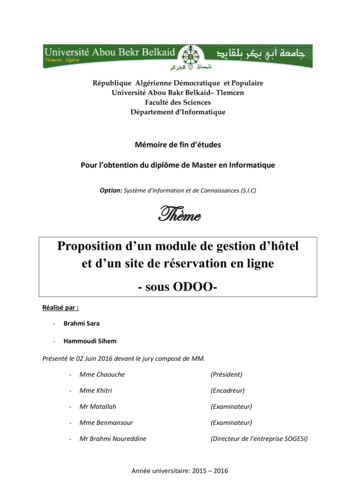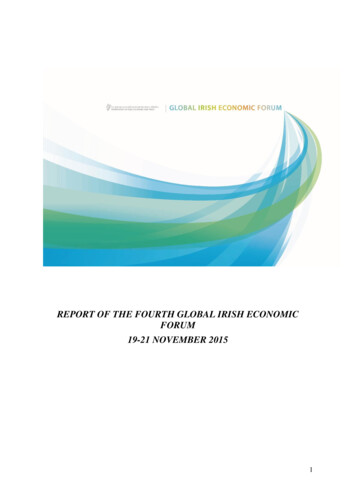
Transcription
REPORT OF THE FOURTH GLOBAL IRISH ECONOMICFORUM19-21 NOVEMBER 20151
ContentsPage NumberExecutive Summary31Introduction42Regional Meetings63GIEF Opening Panel discussion104GIEF Breakout Sessions165Closing Session246Conclusion and recommendations26Appendix342
Executive SummaryThe fourth Global Irish Economic Forum took place in Dublin Castle on 20-21 November,2015. It was preceded by regional meetings of the Forum which took place in Derry, Galway,Limerick and Laois on 19 November and which included mentoring and networking sessionswithin specific sectors.As in previous years, members of the Global Irish Network joined members of theGovernment, Ministers of State, senior officials, presidents of third level institutions,members of the opposition and domestic business leaders for discussions. In line withprevious Forums, the entire memberships of the Global Irish Network was invited to attendthe 2015 Forum. Participants were asked to look towards the future and to re-imagine Irelandas the economy continues to develop and grow after recent years’ difficulties.There was a specific emphasis on a select number of sectors with high growth and jobcreation potential. The two days included plenary sessions, panel debates and sectoralbreakout sessions and in line with previous Forums many of the specific outcomesemerged from the breakout sessions.These sessions targeted a few specific areas of high potential where the Global IrishNetwork can add real value; branding Ireland’s financial services industryglobally, international education, networking Ireland’s alumni and further developing thebusiness element of our diaspora engagement.Over the course of the Forum participants put forward a number of proposals and the IrishAbroad Unit of the Department of Foreign Affairs and Trade leads engagement withGovernment Departments and Agencies to discuss the outcomes that fall under theirremit.3
1.IntroductionThe fourth Global Irish Economic Forum took place in Dublin Castle on 20-21 November,2015. This was preceded by regional meetings of the Forum which took place in Derry,Galway, Limerick and Laois on 19 November.The overall theme of the Forum in 2015 was to build on our developing economy in asustained and lasting manner. The Forum focused on three pillars which were progressive innature to help shape the Ireland of the future: Economic Development - advancing sustainable growth over the medium and longerterm; Re-imagining Ireland - building a legacy for our future generations; and, Ireland’s place in the world - how our global island responds to internationalchallenges.There was a particular emphasis on a select number of sectors with high growth and jobcreation potential including financial services, international education, research andinnovation, agri-food and the creative economy.In line with previous Forums, the entire memberships of the Global Irish Network wasinvited to attend the 2015 Forum. Comprising approximately 350 Irish and Irish-connectedindividuals based in over 40 countries, the Network which was formed in 2010 providesIreland with an invaluable resource of international expertise.Irish business leaders and other economic stakeholders together with the Government and thethird level sector made up the second group of Forum participants.The two days included plenary sessions, panel debates and sectoral breakout sessions.In line with previous Forums many of the specific outcomes emerged from the breakoutsessions. A number of these sessions targeted a few specific areas ofhigh potential where the Global Irish Network can add real value; branding Ireland’sfinancial services industry globally, international education, networking Ireland’s alumni andfurther developing the business element of our diaspora engagement.Following on from the successful sessions with the Irish SME sector in the 2013 Forum, thefourth Forum also included mentoring and networking sessions within specific sectors. Theobjective was to explore and develop ways of helping Irish companies to expand, therebycreating employment in Ireland drawing on the expertise and local market knowledge ofmembers of the Network. The full programme is set out in Appendix 1.Over the course of the two days in Dublin Castle, discussions raised a number of points forconsideration by Government. This report outlines the issues raised and identifies those for4
further follow-up by relevant Government Departments and State Agencies. A summary ofeach plenary and breakout session is set out below. Where relevant, the key items for followup are identified and a composite list of these 50 issues is provided at the conclusion of thisreport on page 25.Fourth Global Irish Economic Forum, Dublin Castle5
Taoiseach Enda Kenny T.D. and Minister of Foreign Affairs and Trade Charlie Flanagan T.D. at the FourthGlobal Irish Economic Forum, Dublin Castle.2. Regional Global Irish Economic Forum meetingsIn advance of the Global Irish Economic Forum, four regional meetings took place inGalway, Limerick, Derry and Laois. This provided an opportunity for regional centres toengage with members of the Global Irish Network and also aligned with the Government’sRegional Action Plan on Jobs.At the regional meetings a number of the overall themes for the Forum were discussed withmembers of the Global Irish Network the perspectives and experiences they garnered werefed into the debate in Dublin Castle. As with previous Forums the holding of such regionalevents were an important opportunity to spread the impact of the Forum beyond Dublin. Inaddition a number of mentoring and business development sessions were organised in thevarious regional centres which were valuable opportunities to share the expertise of membersof the Global Irish Network with local companies wish to scale internationally.The following sets out the programmes for the 4 regional sessions:6
DerryAn outline of the vibrant start-up scene in the North West region, innovative local socialenterprises fostering young talent and the wider North West economic collaboration.Peter CaseyExecutive Chairman, Claddagh ResourcesElizabeth FrancisFounder, Atelier FrancisColin McClatchieChairman, PrescientCaroline MurphySale and Business Relations, Siam Piwat Co. LtdStella O’LearyFounder and President, Irish American DemocratsNaomi ScottChief Representative, Anglo American MozambiqueSusan WalshDirector/Dean, Globe Business College MunichThis event was organised in partnership with Northern Irish Connections, Northern IrelandScience Park, Letterkenny IT, Derry City & Strabane District Council and Donegal CountyCouncil. Mentoring session with 10 start-ups/SMEs (5 based in Donegal, 5 based in Derry)Meetings with 4 Derry community organisations working with young peopleEngagement with 12 large companies based in the North-west region (e.g. Randox,Seagate)GalwayA view of Galway through the lens of its world-leading Med Tech industry, campaigns forcultural acknowledgement and urban innovation.Brian BarryChairman, Tirna PartnersGerard J. BarryDirector, DeBarra Innovations Ltd.Brian D. P. BuckleyManaging Director, Buckley Executive Energy ConsultantsKevin ConboyPresident, Irish Chamber of AtlantaGerard CreanerPresident, Get Reskilled IncGearóid FahertyChairman, Eurand N.V.Joe KingFormer CEO, Molex Inc.William McLaughlinFounder, Irish American Business Chamber and Network Inc.Maurice O’GormanFormer Senior Executive, NCB CapitalCatherine ToolanManaging Director, Special Projects, Aramark InternationalThis event was organised in partnership with NUI Galway and Galway City Council7
Round table centred on the West's thriving MedTech sector. An excellent opportunityfor the Network members to engage with product-ready medical device start-ups,established MedTech companies resident in Galway and get a sense of why Galway isrecognised as a world-leading MedTech ecosystem. Participating companies includedAerogen, Advant Medical and Merit Medical, Ireland.Session, entitled 'Gaillimh Nua', showcasing the Galway City Innovation District,Galway's 'Smart City' goals, its Marine Institute and Galway's bid to be designated boththe European Region of Gastronomy 2018 and the European Capital of Culture 2020.LaoisAn opportunity to engage with world leaders in the equine and agri-food industry and topositively contribute to entrepreneurial development in Laois and the wider Midlandsregion.John ConroyChief Executive Officer, Acton HoldingsJackie GilnaPresident, International Enterprise Partners Inc. (IEPCAN)Mary McKennaTech Entrepreneur & Co-Founder, Northern Ireland Science ParkMary-Ann O’BrienSenator & Chairperson, Lily O’BriensDermot RowanManaging Director & Co-Owner, Kiely Rowan plc.This event was organised in partnership with Laois County Council and Coolmore Stud Attendance of approximately 80-100 invitees from the business and local governmentsectorInteractive panel discussion on the agri-business sector taking inspiration from the FoodWise Strategy – ‘Local Roots, Global Reach’Engaging exchange entitled ‘Connecting Laois to do Better Business’ with 5 localbusiness leadersMentoring session with 5 young entrepreneurs.LimerickAn exploration of Limerick’s journey towards 2030 – transforming into a creative andinnovative European city and region.Bob BrannockPresident International Protection, Genworth FinancialLoretta Brennan GlucksmanChairman Emeritus, The American Ireland FundMargaret BurgraffVice-President, Software & Services Group and GeneralManager, Intel Services GroupSusan DavisChairman and Founder, Susan Davis InternationalJohn HartnettCEO and Founder, ITLG and SVG PartnersPJ HoughRetired Corporate Vice President, MicrosoftConor McEnroyFounder and Chairman, Abbeyfield GroupTim O’ConnorChairman, The GatheringThis event was organised in partnership with Limerick City and County Council andLimerick Economic Forum8
Interactive exchange with Limerick Economic Forum particularly on Limerick 2030 – a 250 million economic development planPresentations on Limerick’s bid to become European Capital of Culture 2020Showcase event on Limerick 360 encompassing higher education, smart ageing,innovation and technologyIreland’s Entrepreneurs Session at the Fourth Global Irish Economic Forum, Dublin Castle9
Fourth Global Irish Economic Forum, Dublin Castle3. Global Irish Economic Forum Opening Panel discussionsThe Forum began on Friday 20 November with addresses by Taoiseach Enda Kenny T.D.,Tánaiste Joan Burton T.D. and Minister for Foreign Affairs & Trade Charlie FlanaganT.D. Master of ceremonies for the two days was broadcaster and journalist FionnualaSweeney. The opening sessions also included addresses by Dara Ó Briain and David McWilliams.The opening segment of the Forum also included two panel discussions examining the futurefor Ireland’s entrepreneurs and Ireland’s place in the global economy. The following wherethe main themes raised in these discussions:‘Ireland’s Entrepreneurs – Building For The Future’Dublin Castle, Printworks, Friday 20 November 2015ModeratorConall Ó Moráin Managing Director, The Media Group.Guest SpeakerRichard Bruton, T.D., Minister for Jobs, Enterprise & InnovationPanellists:Lauren BoyleEuropean Digital Girl of the Year10
Damien Kennedy Founder, Whey Hey, IIBNMary McKennaTech Entrepreneur & Co-Founder, Northern Ireland Science ParkConnor MurphyFounder, DatahugIseult WardCEO & Founder, FoodcloudFollowing introductory presentations from the guest speaker and panellists, the followingtopics were raised: The need to examine the tax incentives offered to investors, to ensure that Ireland remainscompetitive in comparison to other countries who are seeking investment and FDI. The critical importance of marketing and sales skills in scaling companies internationally - ,Enterprise Ireland’s International Selling Programme is an important initiative in this area. The important role played by mentors in assisting up-and-coming entrepreneurs. Specific difficulties female entrepreneurs encounter in accessing start-up financing, and thehesitation of young women and girls to engage with pursuits such as coding, which aretraditionally seen as male dominated or oriented.‘Ireland’s Place In The Global Economy’Dublin Castle, Printworks, Friday 20 November 2015ModeratorSean Whelan, RTÉPanellistsAvril ConroyDirector of Regional Sales, RosneftIrial FinanExecutive Vice President, Coca-Cola USNiall FitzGeraldChairman, The Leverhulme TrustAnn B. KelleherTMG Vice President, Intel USMartin ShanahanChief Executive Officer, IDA IrelandFollowing introductory presentations from panellists, the following topics were raised: The importance of long-term, overarching economic strategies provided by Government inorder to attract investment. Companies make investment decisions on a 10-20 year basis.Therefore, in order to win investment, stability in tax, in politics and in the regulatorysystem is paramount. Companies are in a ‘war for talent’, and Ireland’s education sector, from primary topostgraduate level, must meet this challenge, in the context of contributing to Ireland’scontinued and sustainable economic development. Continued investment in the educationsector is vital in order to maintain Ireland’s skills base and to ensure this base can respondto changing needs. And overarching and long-term strategy is required to identify and target key exportmarket, particularly emerging markets. These may take time to nurture and grow but, as theAnglo-American relationship is the cornerstone of our economy now, certain Asianmarkets can become the bedrock of economic growth in the future. India and China presentsubstantial growth opportunities. Domestic digital connectivity needs to develop further.11
Breakout session Q&A at the Fourth Global Irish Economic Forum, Dublin Castle4. Global Irish Economic Forum Break-out sessionsOn the afternoon of Friday 20 November and the morning of Saturday 21 November a totalof 12 breakout sessions took place. Participants at the Forum attended two breakout sessionsof their choice, and were joined by government and industry participants.The following were the key themes raised in the course of these breakout sessions:‘International Financial Services: Positioning Ireland For The Future’Dublin Castle, St. George’s Hall, Friday 20 November 2015Moderator: Susan Hayes Culleton, The Positive EconomistSimon Harris, T.D.Minister of State with special responsibility for OPW, PublicProcurement & International BankingSusan DarganExecutive Vice President, State StreetDeclan HegartyGeneral Manager, JP MorganColm LyonFounder & CEO, Fire Financial Services (Rapporteur)Carol WardKey issues raised:COO, Man GLG12
Strong welcome for the IFS strategy and in particular the focus on fintech andpayments systems.While Ireland will always find it difficult to compete with the big hubs in thefinancial sector, it can carve out a very important role in niche services andmarkets.One of the niches identified as offering significant potential was in the area of riskand compliance, where Ireland had strong existing capabilities.The agility of the regulatory framework was identified as a key ongoing issue.The importance of Ireland’s ability to attract and retain talent in the sector washighlighted. The socio-economic conditions contribute significantly to this.The Government should give further consideration to support for entrepreneurship,including issues such as CGT, share options etcThe new banner brand for the sector was welcomed as a potentially very usefulinitiative in ensuring effective and coordinated promotion overseas.Issues for follow-up: The future development of the Financial Services Strategy should ensure that theinsurance sector is to the fore. Developments in key competitors such as Luxembourg and Singapore needed tobe tracked closely. Consider greater support for entrepreneurship in the treatment of CGT, shareoptions and the introduction of provisions such as the UK Enterprise InvestmentScheme. Ministerial-led trade missions are very effective but greater effort should be madeto link in with industry in the planning phase.‘International Education: Networking Ireland’s Alumni’Dublin Castle, Conference Centre, Friday 20 November 2015Moderator: Joe O’TooleJan O’Sullivan, T.D.Minister for Education & SkillsKingsley AikinsChief Executive Officer, Diaspora MattersMargaret MolloyCMO, Siegel GaleOrna Ní ChionnaDirector, Royal Mail Holdings plc and Board Member, SaidBusiness School, Oxford UniversityPatrick PrendergastProvost, Trinity CollegeKey themes raised: With over 33,000 International Higher Education students in Ireland there isconsiderable potential to leverage alumni links in the future. The relationship of institutions with their alumni is central but there is potentialfor greater national efforts in alumni engagement which can add value, whilerespecting the primacy of the institutional relationship.13
There is a strong need for data to be available on Alumni, which maps theirspecialities and location, in order to create a framework for international alumnito serve as a source of undergrad/graduate internships, jobs, or otherliving/learning opportunities.Engagement with students at all stages, starting when they enter a HEI andcontinuing right through their lives, is paramount to building the alumnirelationship and can be a very powerful tool in gaining their future assistance inpromoting the overall visibility and “presence” of their institution overseas.There is a need to find better ways to listen to existing students and recentgraduates to build the alumni concept and to take advantage of their ideas andcontributions. There also needs to be a clear ‘ask’ of alumni.Facilitating networking among local alumni as well as re-establishing activeconnection between alumni and their institutions still has strong potential and canstill be enhanced through existing networks (such as Irish Network USA.)Issues for follow-up: We need to examine how other countries engage with their alumni. There may besome valuable knowledge and lessons to be harvested from a specific study of thisarea.‘The Business Of Diaspora: Better Together’Dublin Castle, St. Patrick’s Hall, Friday 20 November 2015Moderator: Norah Casey, HarmoniaJimmy Deenihan, T.D.Minister of State with responsibility for Diaspora AffairsNiamh BushnellDublin Commissioner for Start-upsJohn FitzpatrickChair, American Ireland FundsClem GarveyPresident, Network IrlandeCiara KennyEditor, Generation Emigration - Irish TimesJoanna MurphyKey themes raised:Chief Executive Officer, Connect Ireland Clear recognition of the positive impact of the creation of the Office of theMinister for Diaspora.Members of the diaspora want to be involved and want to help but it has to be onmatters of interest to them on a sectoral basisThe importance of culture as a connector and unifier was acknowledgedA number of obstacles to returning emigrants were highlighted; includingaccommodation.14
Issues for follow-up: A programme like the Israeli Taglit programme should be considered to connect2nd/3rd/4th generation young Irish diaspora with Ireland. Issue of voting rights for emigrants needs to be considered A proliferation of networking organisations often working in broadly the samespace, but there has to be some attempt to draw them together. Consideration should be given to the possibility of holding future Global IrishEconomic Forums in different locations. The situation where second generation Irish, who have not been primarilyeducated in Ireland, are charged full university fees should be examined. Create a call centre for ‘Ireland Inc’ for people to make contact to get advice onissues on diaspora connections, return to Ireland etc.Sectoral Roundtable at the Fourth Global Irish Economic Forum, Dublin Castle15
Engagement with Irish Companies – Sectoral Roundtable on AviationDublin Castle, Saturday 21 November 2015Facilitators:Enterprise IrelandRapporteurDonal BoylanKey issues raised: Overall a whole-of-government approach is required to solidify and expandIreland’s considerable track record in the aviation industry. The vocational sector should not be ignored. The creation of theGrangegorman Campus is a great opportunity to create greater linkagesbetween training apprentices and industry. The IATA Conference will take place in Ireland in June 2016 and theopportunities associated with this should be maximised.Issues for follow-up: Work needs to be undertaken to upgrade the SARP scheme to ensure that keydecision makers and senior management will locate here. Initiatives must be undertaken to attract high level executives to Irelandincluding establishing an international school in Ireland and developing taxincentives. Springboarding off the IATA Conference, consideration should be given todesignating 2017 as the Year of Aviation in Ireland. Consideration should also be given to whether Ireland needs anAviation/Aerospace technical institute. Work should also be undertaken, via an Aviation Alumni Network event, tomap out the Aviation DiasporaEngagement with Irish Companies – Sectoral Roundtable on Financial Services(Group A & Group B)Dublin Castle, Saturday 21 November 2015Facilitators:Enterprise IrelandRapporteurBrendan McDonagh (Group A) and Gearoid Doyle(Group B)Key issues raised: The burden and cost of compliance and regulation have become a major issuefor banks and insurance companies globally. A large amount of time, moneyand effort is been spent by banks just to stay in the game. Bank are alsowalking away from opportunities due to the burden of high compliance. We need to engage with the Banks and the insurance industry. Throughengagement can we identify what the banks want to outsource in thefuture. Relieving this burden can create high quality jobs for new SME’s andbuild specialist expertise.16
Look at opportunities and support new technology that can help automatecertain parts of the compliance process and reduce the burden and hence risks.The global payments industry is changing rapidly with the emergence of newplayers in the payment sector such as technology companies like Apple andGoogle. Banking is about to undergo a radical change and Ireland could takethe lead in this area.Disruptive technology in the payments industry is required and likely and weneed a new system to cope with and understand this. Ireland has a largenumber of successful companies in this area and we need to know how tocreate more companies like these and leverage the skills and knowledge wecurrently have.Ireland has an advantage with global technology companies like Apple andGoogle based here. We should look at ways to leverage this. Encouragegreater engagement between these technologies company’s and the paymentsindustry.Banks should be presented with competitive proposals and solutions.Issues for follow-up: Ireland could position itself as a Centre of Authority for Compliance or aGlobal Compliance Hub. This will require a greater investment in time, effortand resources in law education which focuses on understanding andinterpretation of the high volume of regulation.There is an opportunity to create a Centre of Excellence in the area ofcompliance and set a high standard, stay ahead of the curve in terms of newregulations and the interpretation of the law. This could be the “go to place”for indigenous industry, large banking organisations and global players forcompliance related issues and knowledge.Engage with banks, global players and the payments industry to get a betterunderstanding of the current issues and problems in the industry.Research needs to be carried out to understand what the new or emergingtechnologies in this area are. Research centres should focus on payments andcompliance issues. Ireland could be positioned as an early adaptor for newtechnology. Look at ways to support new technology companies and SME’s inthis area.Look at solutions to help new SME’s approve new software or emergingtechnology for use in the banks so that the banks don’t have to go through theprocess. For example, can we introduce an accreditation process to validatenew technology that has reached required standards?Encourage engagement between the education sector and industry and find outwhat does the industry require in terms of skills. Focus on upskilling andspecialist training in the area of compliance and law.17
Engagement with Irish Companies – Sectoral Roundtable on ICTDublin Castle, Saturday 21 November 2015Facilitators:Enterprise IrelandRapporteurPhilip MoynaghKey issues raised: The fast beat the slow in the ICT world – Ireland can be fast. We need to make Ireland a compelling place for non-Irish. For exampleevents like the Marriage Equality referendum are helpful in this regard. We need to get better at accessing finance; closing the sale; leveraging FDI. Ireland should aim to become the best small country in the world for scalingsmall business.Issues for follow-up: There is good support for small and start-up companies in the ICT sector,however more needs to be done on scaling small to medium. More focus is needed on acquiring talent and getting emigrants back. To enable our existing talent pool it is necessary to better utilise mentoringopportunities Greater focus should be placed on developing the talent pipeline throughinitiatives such as coder-dojo There needs to be greater focus on the potential offer in the areas of Big Dataand Internet of Things.Engagement with Irish Companies – Sectoral Roundtable on ManufacturingDublin Castle, Saturday 21 November 2015Facilitators:Enterprise IrelandRapporteurJoe KingKey issues raised: Manufacturers need to innovate and determine how to make themselvesindispensable to customers. The manufacturing sector needs to move frontend organisation to be closer to customers and this is best achieved throughdeveloping better marketing and design skills.Large companies cannot innovate as effectively as small ones –the suppliersthat position themselves as partners and are involved from design stage are themost indispensable. Manufacturers need to move mindset from supplying amachine to supplying a solution.18
The opportunities offered by technology need to be explored further toimprove convergence with the digital world. The Internet of things is a reality– manufacturers should be looking at how this can add attractive service offerto customers or enable savings.In a country where 50% of students don’t advance to 3rd level the reemergence of manufacturing sectors can provide rewarding careers for many.We need to reinvigorate image of manufacturing in Ireland. In part this can beachieved through building on children’s natural curiosity and love of makingthings by increasing number of factory tours.Issues for follow-up: State and industry focus groups should be created to learn together bestpractice in other countries. Increased collaboration in industry should be encouraged through knowledgeexchange, in R&D (especially with 3rd Level) and in clusters (purchasingclusters, market opportunity clusters etc.) Greater focus should be placed on learning from other countries who havereinvigorated their manufacturing sector in recent years e.g. Singapore, U.K.,Germany.Taoiseach Enda Kenny T.D. with participants at the Fourth Global Irish Economic Forum, Dublin Castle19
Engagement with Irish Companies – Sectoral Roundtable on Start-UpsDublin Castle, Saturday 21 November 2015Facilitators:Enterprise IrelandRapporteurRon AndersonKey issues raised: An emerging challenge for the start-up companies was engaging in fundingrounds beyond seed funding and achieving scale. To address this challengecompanies should seek qualified investors with sectoral expertise and ensure thatthe investor has an active place on the Board. A key question was the best way to create awareness of Ireland as a start-updestination, some of the suggestions included a dedicated business channel fromthe national broadcaster (RTE) in order to share news stories of new business andtheir achievements, bring more international people to Ireland (use the networkof the GIN members and also identify influencers in industry that have studied inIreland). It was acknowledged that there was no obvious mechanism to engage the largeIrish diaspora behind the existing GIN members. If this ‘silent diaspora’ couldbe engaged there is the potential to harness resources for the benefit of Irishcompanies. Irish companies need to ‘think big’ when networking in Asia and N. America.Issues for follow-up: Outreach should be extended beyond existing diaspora to include the 2nddisapora (those educated in Ireland and now involved in industry in relevantgeographical markets) and the GIN members own business/family contacts. Develop a portal/database with specific profile information, which would allowGIN members to opt in rather than have non-specific continuous information andthey could tailor their searches to their specific skills and experiences which canthen be aligned to the needs of the Irish companies.20
Research & Innovation – the Future of Challenge-based Research Funding in IrelandDublin Castle, Saturday 21 November 2015Facilitators:Science Foundation IrelandRapporteurJim SullivanKey issues raised: While Ireland is relatively new to the business of investing in science andtechnology, significant progress has been made in developing talent, underpinningboth MNC investment and SME creation. The continued nurturing of young talent iskey to success. The imperative now is to achieve greater impact from investment and it is necessaryto identify niche challenges around which to concentrate efforts in order to deliverthis impact for Ireland. A recurring theme during the deliberations related to theopportunities around converging industries and disciplines.Noting past investment in S&T areas in Ireland and areas of “uniqueness” to this countryseveral sa
Round table centred on the West's thriving MedTech sector. An excellent opportunity for the Network members to engage with product -ready medical device start -ups, established MedTech companies resident in Galway and get a sense of why Galway is recognised as a world -leading MedTech ecosystem. Participating companies included



